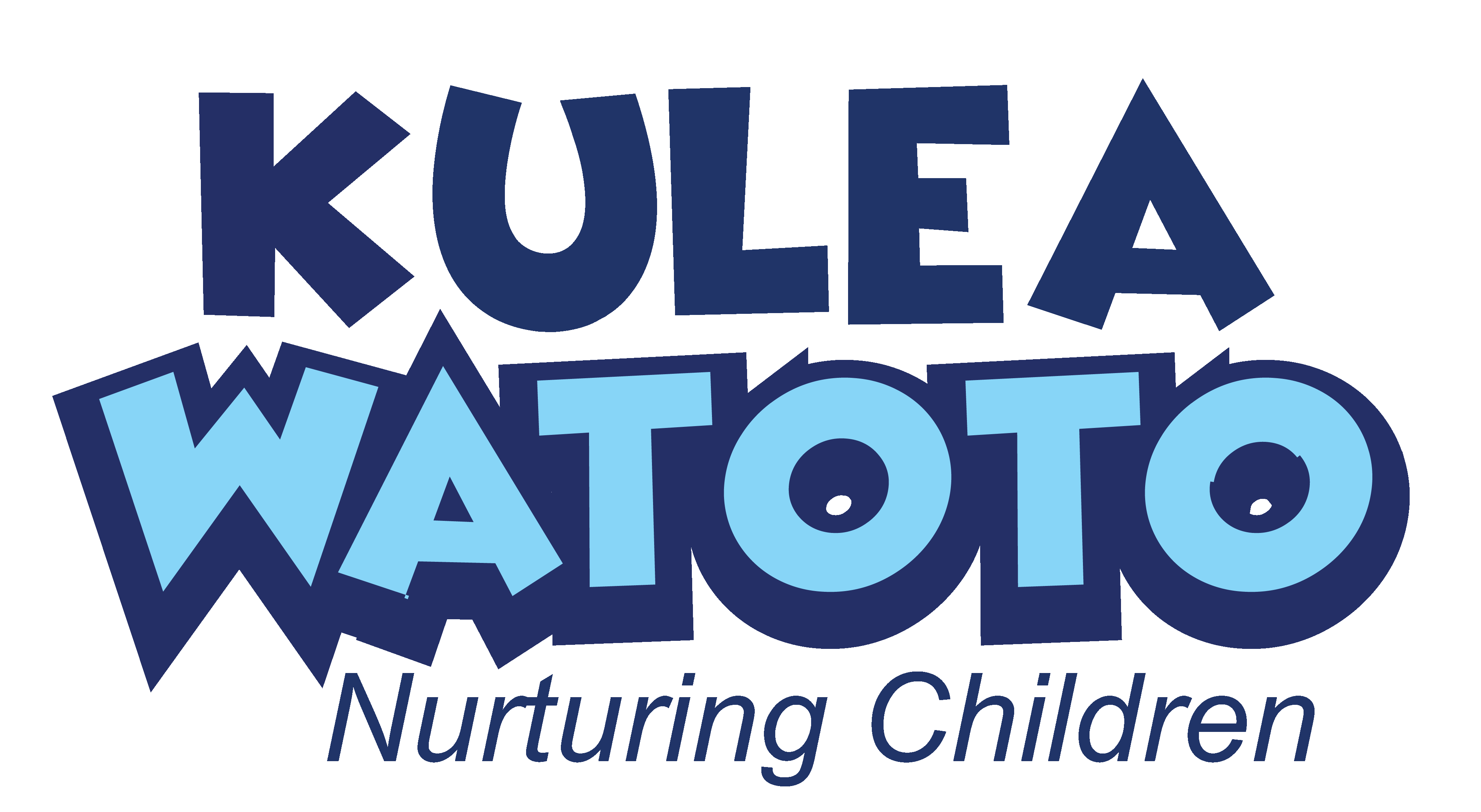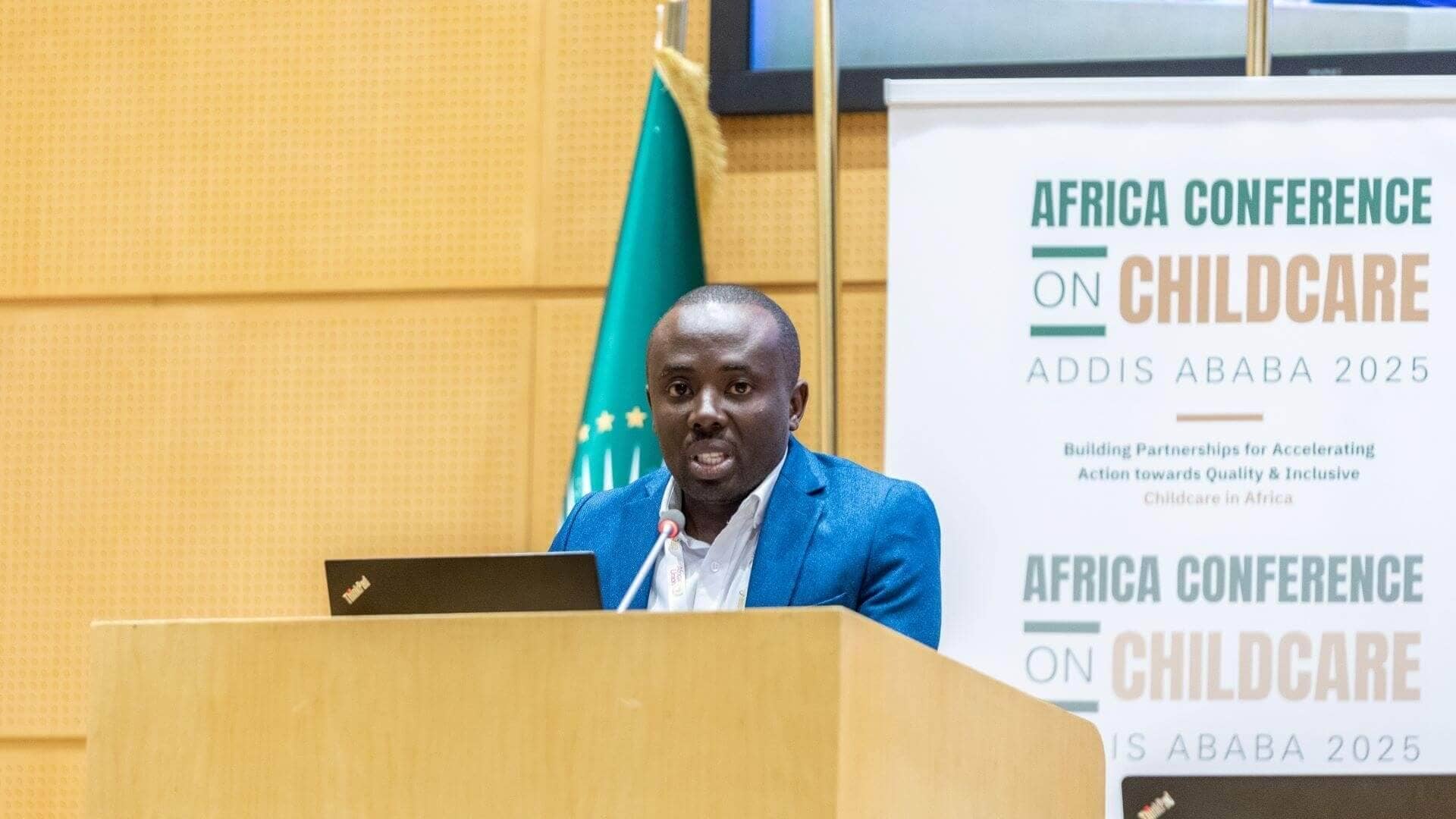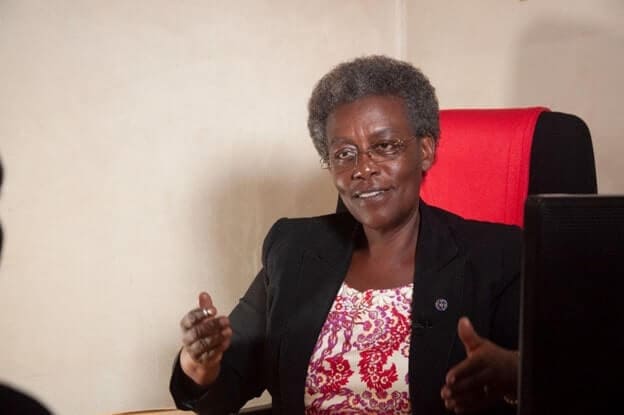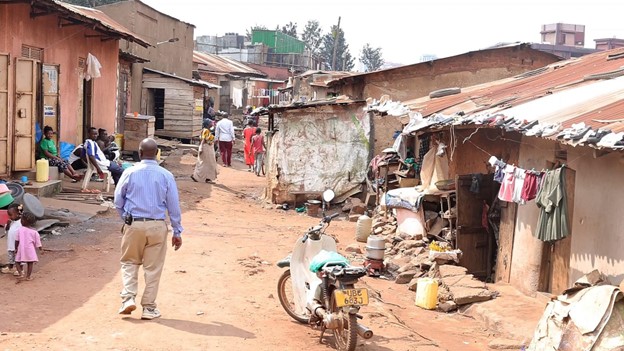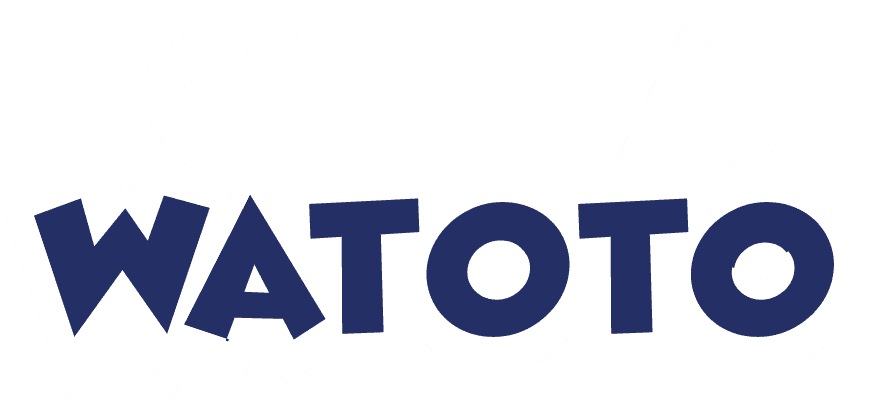Cultivating Hope: A Community's Commitment to Learning and Growth
Cultivating Hope: A Community's Commitment to Learning and Growth
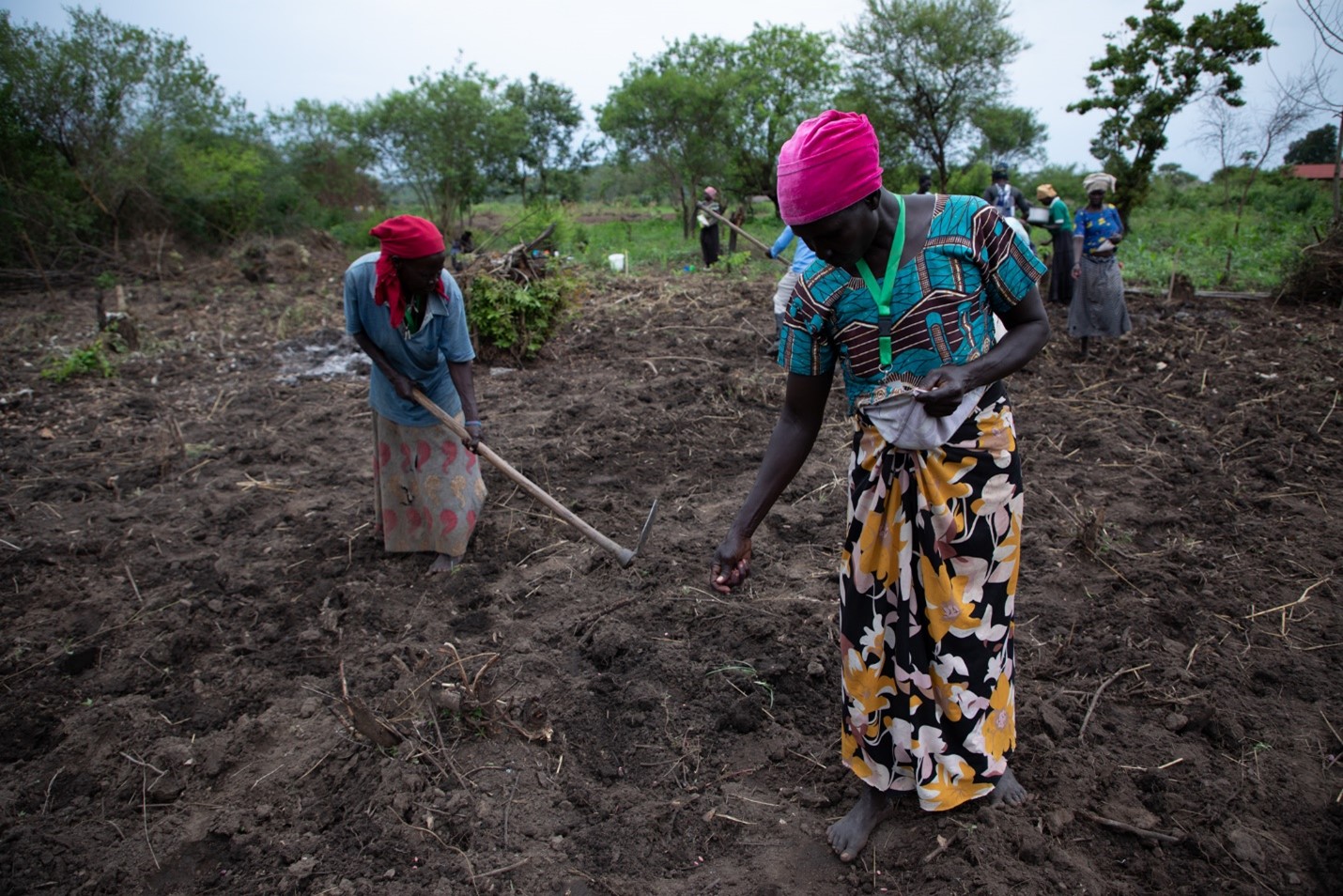
Parents at Mungufeni Home Learning Center sow maize seeds at a garden next to the school. The Center Management Commitee plans to harvest the crops to provide meals for learners at school and also support with scholastic materials
In the heart of the Monopana Village, Chabili Parish, Romogi Sub- County, 45 kilometers from Yumbe Town, heavy rains have created opportunities for parents in both host and South Sudanese refugee communities. They are seizing the chance to cultivate a variety of food crops to support the young children attending early learning.
At the Mungufeni Home Learning Center in the Bidi Bidi refugee settlement, caregivers and parents are busy growing sweet potatoes, cassava, maize, and vegetables. Once harvested, these crops will not only provide meals for the children but will also be sold to generate revenue. This income will help the caregivers supply porridge to students, ensuring that no child goes hungry while at school.
The center's operations rely heavily on its Center Management Committee (CMC), which actively engages parents in regular fundraising efforts for essential resources. Kassim Juma, the landlord and chairman of the CMC, expresses his gratitude for the technical guidance provided by the Literacy and Adult Basic Education (LABE) program, a consortium partner in the Kulea Watoto Project.
“I voluntarily gave my land for the home learning center because I believe that educating our children will transform our lives,” Kassim shares. “With LABE’s support in designing, and the efforts of parents who baked bricks and looked for other building materials, we were able to build our classroom block. The nearest nursery schools are over 40 kilometers away - how could our children have accessed proper education otherwise?”
LABE continues to guide the CMC in executing its duties as the International Rescue Committee (IRC) focuses on the livelihood aspect, ensuring parents and caregivers can engage in sustainable farming activities.
“Kulea Watoto supported us with farm tools like hoes, pangas, rakes, slashers etc, and also gave us seeds to plant,” Kassim explains. “IRC, particularly, has also continued to train us on good farming practices and continues to monitor our progress in the garden. When the crops are ready, we plan to serve some at the school and sell the rest to buy maize flour to feed our learners and educational materials.”
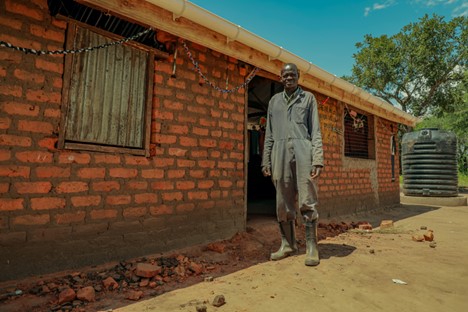
Kassim Juma freely offered land on which the learning center was erected. With the nearest nursery schools over 40KMs away, his genorosity has supported over 300 children to access learning in this community. ©IRC/Jonathan Ssekitondo
To enhance the nutritional value of the porridge, the school also grinds simsim seeds to mix with the maize flour.
“The children need nutrituous balanced meals. They cannot study well without food as meals are very important for their growth,” Kassim emphasizes.
Mungufeni Home Learning Center currently enrolls over 300 children from both the refugee and host communities. To ensure children have ample play materials, parents dedicate one day each week to create toys.
Rukia Mata, a mother of four at the center, proudly participates in crafting dolls and balls from fabric scraps donated by tailors from Yumbe Town. She is thankful that their children are at school, and not loitering around in the village.
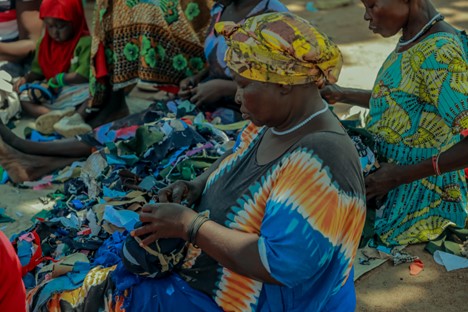
Rukia Mata crafts a ball out of fabric scraps at Mungufeni Home Learning Center. She is grateful for the support in starting up the learning center as it has given chance to their children to have early education essential for a good start in future learning. ©IRC/Jonathan Ssekitondo
“Our children are in school thanks to Kulea Watoto supporting us to establish this learning center. We are very happy because all that they used to do was loiter around in the village, but now, they are in a controlled environment learning. (So) I freely come at the center to join fellow parents to develop play materials like balls, ropes because they also need to interact with their peers, and play is an important part of that,” she says.
In the heart of the Monopana Village, Chabili Parish, Romogi Sub- County, 45 kilometers from Yumbe Town, heavy rains have created opportunities for parents in both host and South Sudanese refugee communities. They are seizing the chance to cultivate a variety of food crops to support the young children attending early learning.
At the Mungufeni Home Learning Center in the Bidi Bidi refugee settlement, caregivers and parents are busy growing sweet potatoes, cassava, maize, and vegetables. Once harvested, these crops will not only provide meals for the children but will also be sold to generate revenue. This income will help the caregivers supply porridge to students, ensuring that no child goes hungry while at school.
The center's operations rely heavily on its Center Management Committee (CMC), which actively engages parents in regular fundraising efforts for essential resources. Kassim Juma, the landlord and chairman of the CMC, expresses his gratitude for the technical guidance provided by the Literacy and Adult Basic Education (LABE) program, a consortium partner in the Kulea Watoto Project.
“I voluntarily gave my land for the home learning center because I believe that educating our children will transform our lives,” Kassim shares. “With LABE’s support in designing, and the efforts of parents who baked bricks and looked for other building materials, we were able to build our classroom block. The nearest nursery schools are over 40 kilometers away - how could our children have accessed proper education otherwise?”
LABE continues to guide the CMC in executing its duties as the International Rescue Committee (IRC) focuses on the livelihood aspect, ensuring parents and caregivers can engage in sustainable farming activities.
“Kulea Watoto supported us with farm tools like hoes, pangas, rakes, slashers etc, and also gave us seeds to plant,” Kassim explains. “IRC, particularly, has also continued to train us on good farming practices and continues to monitor our progress in the garden. When the crops are ready, we plan to serve some at the school and sell the rest to buy maize flour to feed our learners and educational materials.”

Kassim Juma freely offered land on which the learning center was erected. With the nearest nursery schools over 40KMs away, his genorosity has supported over 300 children to access learning in this community. ©IRC/Jonathan Ssekitondo
To enhance the nutritional value of the porridge, the school also grinds simsim seeds to mix with the maize flour.
“The children need nutrituous balanced meals. They cannot study well without food as meals are very important for their growth,” Kassim emphasizes.
Mungufeni Home Learning Center currently enrolls over 300 children from both the refugee and host communities. To ensure children have ample play materials, parents dedicate one day each week to create toys.
Rukia Mata, a mother of four at the center, proudly participates in crafting dolls and balls from fabric scraps donated by tailors from Yumbe Town. She is thankful that their children are at school, and not loitering around in the village.

Rukia Mata crafts a ball out of fabric scraps at Mungufeni Home Learning Center. She is grateful for the support in starting up the learning center as it has given chance to their children to have early education essential for a good start in future learning. ©IRC/Jonathan Ssekitondo
“Our children are in school thanks to Kulea Watoto supporting us to establish this learning center. We are very happy because all that they used to do was loiter around in the village, but now, they are in a controlled environment learning. (So) I freely come at the center to join fellow parents to develop play materials like balls, ropes because they also need to interact with their peers, and play is an important part of that,” she says.
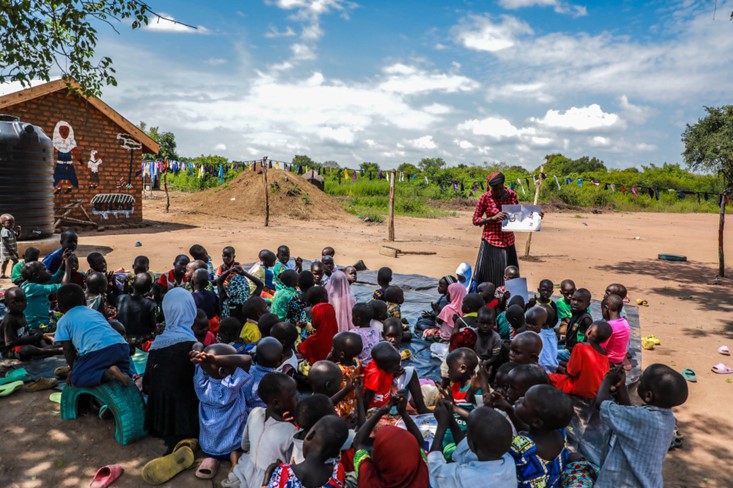 | 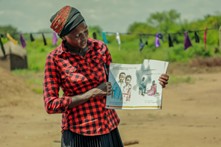 |
Amina Draru Vicky Kadi, the lead caregiver, acknowledges the transformative impact of the Kulea Watoto Project on their community. “We are so grateful for the support our community received to establish Mungufeni Home Learning Center,” she states. “The training in Care for Child Development (CCD) that I received from the project has also helped me understand better how to teach children, engage them in play, and, most importantly, listen to them,” she states. According to Draru, children learn numeracy and literacy through play. “Learning through play helps children to socialize, memorize what they are taught, build different life skills and enjoy lessons as part of the fun,” she adds.
Furthermore, the initiative to plant food crops at the center serves as a model for parents, encouraging them to replicate these efforts within their own homes and communities to fight malnutrition among their children. Caregivers regularly educate parents on the importance of providing balanced meals.
“At the center, we also teach parents good farming practices using our demonstration gardens so they can learn to cultivate a variety of crops and maintain their own gardens at home,” Draru explains.
 | 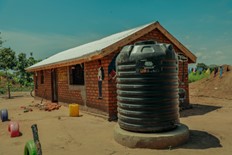 |
L-R: Learners play with the teacher at Mungufeni Home Learning Center. A class block stands. The block was constructed thank to support from Kulea Watoto, and parents in the community who provided all the building materials. ©IRC/Jonathan Ssekitondo
As the Mungufeni Home Learning Center continues to thrive, the collaboration between parents, caregivers, and the Kulea Watoto Project is fostering an environment where children can flourish in both education and nourishment. The initiative not only addresses immediate hunger but also plants the seeds for long-term sustainability and empowerment within the refugee and host communities.
With every seed sown and every porridge served, these families are not just feeding their children; they are nurturing a generation of hopeful, resilient individuals who will grow to contribute positively to their society. The lessons learned within the center extend far beyond its walls, inspiring parents to emulate these practices at home, ensuring their children receive balanced meals and an education vital for their future.
